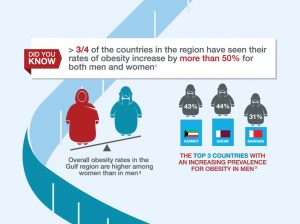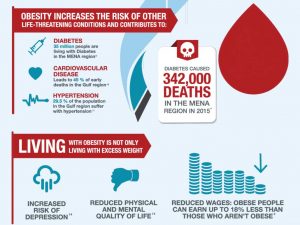Despite global efforts to stem the obesity epidemic, no country has succeeded in decreasing obesity in the last 33 years. Worldwide obesity has more than doubled since 1980, with almost 30% of the population overweight or obese.
In the Middle East, obesity rates among adults are exceptionally high at more than 37% in Kuwait and more than 35% in Qatar, Saudi Arabia and Jordan, according to the latest figures from World Health Organisation (WHO).
Overly Simplified Campaigns
According to experts most campaigns aimed to combat the disease overly simplified obesity by focusing on healthy eating and exercise, when the reality is that obesity is not a lifestyle choice, but a chronic disease with complex origins. In addition, simplifying obesity poses the risk of stigmatising people with obesity instead of treating them as patients and providing them with access to viable treatment options. The belief that obesity is a lifestyle choice remains prominent, significantly affecting the psychosocial well-being and behavioural patterns of people with obesity.
Weight bias is society’s last acceptable form of discrimination and is largely driven by limited understanding of obesity, said Dr Nadia Ahmad, Founding Director of the Obesity Medicine Institute in Dubai and Senior Advisor for Obesity Solutions at Johnson & Johnson Medical Devices Middle East.
Environmental, social, dietary factors and aspects relating to common medications, stress and sleep can all play a role so there is no ‘one size fits all’ approach to combatting obesity.’
A growing body of research supports the concept of ‘set point’, which posits that regardless of what you would like your weight to be, your brain has its own sense of how much body fat you should retain and regulates energy intake and expenditure to maintain levels within a ‘set point’ range.
Research also suggests that when people with obesity go on a calorie-deficit diet, there are significant alterations in appetite hormones leading to increased food intake, reductions in energy expenditure including changes in ‘muscle efficiency’ that together can increase body weight.
Measures to introduce healthier food options at schools, to tax sugary drinks and to encourage people to exercise are all important steps towards promoting a healthy lifestyle, but some individuals still struggle to lose weight based on lifestyle modification alone and may require pharmacotherapy and metabolic surgery.
In addition, while prevention is critical for the next generation, it is of little use to those already severely affected by obesity, which can lead to serious co-morbidities such as diabetes, hypertension and cardiovascular problems, and ultimately shortens lives.
Obesity and Diabetes
The MENA region is at the epicentre of an obesity and diabetes crisis, according to Dr Karl Miller, Chief Medical Officer at JJMD Middle East and Vice President of the Obesity Academy Austria. There are 318,000 deaths caused by diabetes each year in the region alone.
Diabetes prevalence in MENA stands at 10.8%, the second highest among regions monitored by the International Diabetes Federation (IDF), which projects the number of people with diabetes in MENA to increase by 110% to 82 million in 2045 from 39 million in 20175.
Spending on diabetes care in the region, as a percentage of total health expenditure, stands at 17% compared with 12% globally, according to the IDF, which said healthcare expenditure in MENA is expected to increase by 67% to US $35.5 billion by 2045 from US $21.3 billion in 2017.
The rising social and economic burden of obesity requires a new approach to tackling this chronic disease. The current patient pathway to surgical intervention can take as long as eight years, according to Dr Ahmad, even though metabolic surgery is associated with higher diabetes remission rates, lowered mortality risk, fewer complications, higher weight loss and improved quality of life than controls in the short- and long-term.
To make real progress in the fight against obesity, partnerships are required on every level to guide patients appropriately through the treatment pathway from prevention to access to treatment and long-term follow up.
** This feature article is shared by Johnson & Johnson Middle East. Visit their website for more information.










